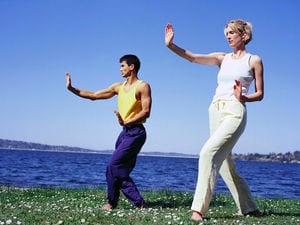
MONDAY, Sept. 10, 2018 (HealthDay News) — The ancient practice of tai chi may beat strength training and aerobics for preventing falls among seniors, a new trial shows.
A modified senior-centered tai chi program reduced falls nearly a third better in a head-to-head comparison with an exercise regimen that combined aerobics, strength training and balance drills, the researchers reported.
“This tai chi program better addressed the deficits that were contributing to fall risk,” said senior researcher Kerri Winters-Stone, a professor with the Oregon Health & Science University School of Nursing.
Tai chi is a centuries-old Chinese tradition that involves a graceful series of movements. People performing tai chi flow between different postures in a slow and focused manner, keeping their body in constant motion and frequently challenging their balance.
Researchers have long suspected that tai chi can help reduce risk of falling, said co-researcher Peter Harmer, a professor of exercise and health science with Willamette University in Salem, Ore.
Annually, about 28 percent of U.S. seniors report falling, and 2 out of 5 falls result in injuries leading to an ER visit, hospitalization or death, researchers said in background notes.
“Falling in adults age 65 and older is significantly associated with loss of independence, premature mortality and big health care costs,” Harmer said.
The movements of tai chi require people to move in all directions, while traditional exercise programs focus more on forward and backward motion, Winters-Stone and Harmer said.
“The reality of how falls happen tends to be quite varied and a bit unpredictable. In tai chi, the movements are in these multiple planes,” Winters-Stone said. “You’re moving your body outside of your center of gravity and then you’re pulling it back. There’s a lot of postural responses.
“If you accidentally started to fall, if you had been trained in tai chi you would probably be better at starting to counteract that movement and regain your balance,” Winters-Stone continued.
But classical tai chi can involve upwards of 100 different movements, which can be challenging for seniors to learn, Harmer said.
So, the research team for this clinical trial developed a pared-down form of tai chi that focuses on eight fundamental movements most related to fall prevention, Harmer said. The trademarked program is called Tai Ji Quan: Moving for Better Balance.
To see how well the program works, researchers tested it against both a traditional exercise program and a control group that only performed stretching exercises.
Researchers recruited 670 Oregonians with an average age of nearly 78 and assigned them to one of the three programs. “This was a more at-risk group than we’ve worked with before,” based on both their age and screening for fall risk, Harmer said.
After six months, the tai chi group was 58 percent less likely to have a fall than the stretching group, and the traditional exercise group was 40 percent less likely to fall than people who only stretched.
Compared against each other, the tai chi program outperformed traditional exercise. People taking tai chi suffered 31 percent fewer falls than those who took strength training and aerobics courses.
“Not falling is a pretty complex physiological behavior,” Harmer said, noting that you combine muscle strength with feedback from muscles and joints, eyesight and even hearing to regain your balance. “Tai chi directly challenges the integration of all those things.”
Although tai chi did work better, people following a traditional exercise program still gain a benefit, noted Nathan LeBrasseur, a physical medicine and rehabilitation researcher with the Mayo Clinic in Rochester, Minn.
“I would not discourage people who are actively participating in a strength and aerobic exercise program to throw in the towel and say, ‘Now I need to do tai chi,'” said LeBrasseur, who wasn’t involved in the study. “The real challenge is getting people to adopt and stick to an exercise program.”
Harmer said tai chi not only improves balance, but also improves confidence.
“We’ve found a major risk factor for people falling is fear of falling,” Harmer said. “People might have had a fall. They’re scared then of falling again, so they start doing fewer physical things so they don’t fall. It kind of becomes a self-fulfilling prophecy.”
The modified tai chi program requires people to push themselves out of their comfort zone, breaking the negative cycle, Harmer said.
LeBrasseur agreed that whatever the exercise, more should be asked of seniors if they want to protect their health.
“I do think we tend to hold back across multiple exercise interventions in terms of really challenging and pushing older adults with the notion it will lead to harm and injury, when in fact it probably will drive beneficial adaptations,” LeBrasseur said.
The new study was published Sept. 10 in the journal JAMA Internal Medicine.
More information
The U.S. National Center for Complementary and Integrative Health has more about tai chi.
